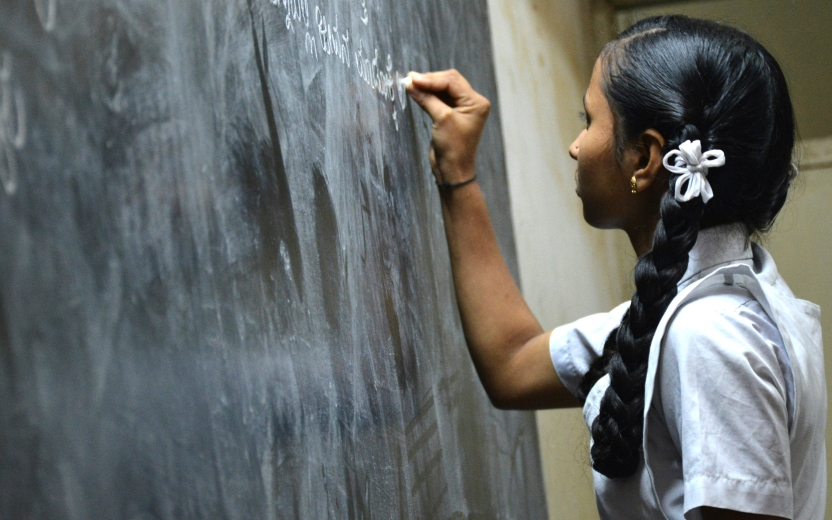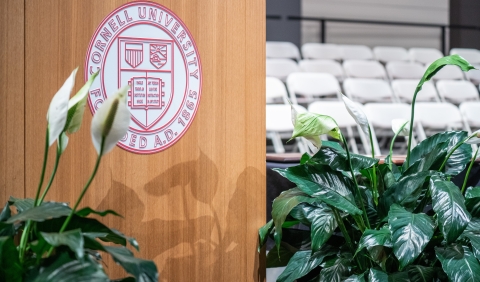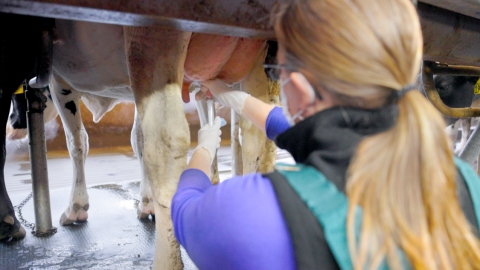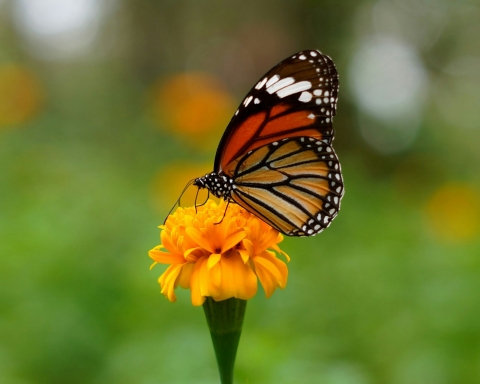High School Students
It's never too early to start preparing for your future at the Cornell University College of Veterinary Medicine!
Our veterinary students have an interest in animals, science and learning, and are strong academic achievers. We recommended that you volunteer with a veterinarian to experience what they do and explore the profession. It is also important to work hard in your studies and spend time researching your college options.
As you go through your high school program, make sure you take a full course load that will prepare you for a rigorous college curriculum, especially in the sciences.
Advanced Placement (AP) Credit: What counts?
Chemistry and Physics with a score of 4 or higher, will satisfy the General Chemistry and Physics prerequisite courses and credits, respectively. AP English and Biology will not.
However, AP English or AP Biology may help you skip freshman level, introductory courses. This will allow you to take a year of upper-level course, e.g. biology course with labs, that fulfill our requirements in those areas.
Visit the College Board website to know more about AP courses.
Other Required Courses
High School
Take all college preparatory courses in all major subjects especially biology, chemistry, physics, calculus, trigonometry, statistics, environmental/earth science and English. Computer science, history, and languages are also important. Take all at the highest level your high school offers. New York State students should earn a NYS Regents diploma.
College
- You need at least 60 semester credits (the equivalent of two years of full time study) to enter the program, as long as you have completed all the prerequisite credits and courses. This means that you can enter the D.V.M. degree program as early as the end of your sophomore year in college, and a bachelor's degree is not required.
- You can study any major, so choose one you enjoy as long as you can gain all the required prerequisite courses. Most veterinary colleges require 10-12 college science courses.
Choosing a Four-Year College/University
When considering what college or university to apply and attend, remember to:
- Apply to the most competitive colleges into which you believe you can gain acceptance.
- Consider your learning style, the majors available, the extracurricular activities, internship and research options, and any other activities that will make you a well-rounded student.
- The Admissions Committee will assign points to the college you attended based on how competitive it is. We measure the competitiveness based on the Peterson's Guide to Four-Year Colleges ranking system. They then compare your college to those of other applicants.
Make sure to balance your academic and extracurricular life in college. Knowing how to prioritize school with your personal life and other activities is a good lesson to learn early on in your college career, and will help your success in both gaining admission and doing well in our D.V.M. curriculum.
When to Apply to the D.V.M. Program?
- Most students start preparing their application during their junior year and submit it in the fall, when they are starting their senior year. For an overview of the process, visit our application timetable.
- Highly qualified students may apply in the spring of their sophomore year under our Early Acceptance pathway and enter the program after the completion of their third year of college.
- Some students may even apply as early as the end of your freshman year, as long as they have the appropriate number of prerequisite credits and courses completed and a minimum of 30 semester credits in college.
Animal Experience
Although finding opportunities to volunteer or work for a veterinarian while in college may be easier, you should start getting animal experience as early as possible.
During high school, you can:
- Volunteer at a local shelter, a zoo, a wildlife center, a humane society. Work in a pet shop or a stable, cleaning or grooming horses
- Participate in 4-H
Tips
- Try to work with several animal species, not just cats and dogs. We value a diversity of experiences.
- Keep track of the hours of experience you gain.
Transcripts
- We don't ask for high school transcripts or SAT scores.
- However, pay close attention to course choices, GPA, and studying for the SAT.
- This will allow you access to a larger selection of colleges, and choose one that will prepare you better for the D.V.M. program.
Things to remember:
- When you apply, you must send all your official college transcripts to VMCAS, and your AP Chemistry and/or Physics scores to us.
- For any college-level courses taken in high school, you must have the transcript from the college that awarded the credits (not your high school transcript).
Summer Program for High School Students
Learn about the profession through joining the Veterinary Explorations Program of the Precollege Studies. As a high school student, you can register for credit courses. This summer program is offered through Cornell's School of Continuing Education and Summer Sessions.
We recommend the following courses:
Other precollege studies courses of interest:
Strengthen Your Preparation for a Future Application
- Sign up for an Admissions presentation and tour. We host them one Friday afternoon each month, from March to November. The visit is divided in two parts of about one hour each: a presentation, and a tour guided by a current D.V.M. student.
- Schedule an individual appointment to talk with the Director of Admissions over phone or Zoom. Please use this Bookings link (appointment details can be found under the 'i' info button). On campus appointments (Tuesday-Friday only) can be made by calling 607.253.3700 and selecting Admissions.
- Sign up for a Pre-Vet or an Applicant Roundtable where you can learn more about how applications are reviewed and ways to strengthen a future application.
Let's Stay in Touch!
- Come to our yearly Open House, typically held the second Saturday in April. This day is free and open to the public.
- Sign up for our monthly Pre-vet Newsletter. You will receive admissions updates, articles about our students and faculty, and invitations to programs on campus, off campus and via Zoom. PreVet Newsletter Sign up







